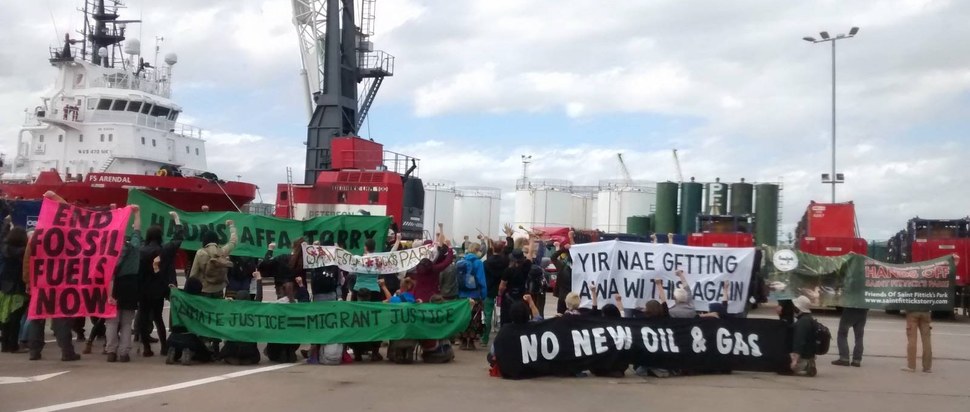Just Transition: In conversation with Climate Camp Scotland
We meet with Climate Camp Scotland to discuss reclaiming green spaces, taking on the far right, and building a climate justice movement that welcomes everyone
This summer, Climate Camp Scotland invites all of us to build a fossil fuel-free world – one action at a time. The group are bringing new life to Scotland’s long tradition of protest camps dating back to the 1970s nuclear disarmament movement.
Each year, for seven days, members live collectively: they run and participate in workshops, cook and eat together and share training for protests and direct actions. Hosted in different locations, anywhere between the Highlands and the Scottish borders, each year their fight for climate justice has a local and global focus; for Climate Camp Scotland, intersectionality is not simply about bringing siloed movements together, but creating a place for different types of people and their needs. “Everyone is crew,” says Duncan Harbison, an organiser in one of the many working groups that have run the camp for the past four years, tells me. From the camper chopping vegetables to the camper running the kids’ play group, building the world we want to live in demands a celebration of difference. “There’s a role for everybody – activism looks different for different people.”
This year’s camp is focused on 'the climate crisis and the far right' in a political climate of multiple crises. In England, the Reform Party is seeing a growing vote share in local elections and is benefiting from the increase in airtime from traditional media. It’s a trend that Climate Camp Scotland is watching closely. “Reform gets a lot of funding from oil and gas companies with bases in Scotland, especially Aberdeen. They won the local council elections in Lincolnshire and then scrapped the funding for flood prevention. One of the ways the climate crisis manifests itself in the UK is through flooding and increased rainfall,” says Harbison.
The camp isn’t just about coming together for one week of the year: organisers are embedded in their community, fighting local actions to raise awareness of global companies eroding the natural biodiversity of Scottish towns. “Companies like Seapeak, based in Glasgow, benefit financially from Russia’s war in Ukraine. Israeli [conglomerate] Delek own Scottish manufacturing companies that fund human rights violations in occupied Palestine.” Climate Camp Scotland understands that working across borders and upholding our diverse skills, interests, and backgrounds is equally important in achieving climate justice.
The financial interests of the far right stretch around the world, but also change the very landscape of Scotland. In the last year, Climate Camp Scotland has organised protests and direct action to save St Fittick's Park in Aberdeen. “It’s the last publicly accessible green space in that community... The area has had industrial waste after industrial waste dumped on it. They’ve had a massive incinerator built fairly recently. It spews toxic fumes, a few hundred metres from a primary school,” says Harbison. Discussing the intersections of global and local struggles brings terms like land justice to the front of public consciousness, therefore, encouraging us to question who owns the land, who looks after it, and who can thrive on it. The camp challenges land use for industrial profit and works to protect communities’ rights to breathable green spaces. “There’s so much privately owned land in Scotland, it’s used to benefit shareholders rather than local people and their ecosystems.”
Scotland’s economy and job market rely heavily on the fossil fuel industry. As a working-class movement, Climate Camp Scotland knows the people must reclaim the narrative of a ‘just transition’. Justice for workers ensures climate justice policies are concerned with “transitioning away from systems, not people.” As Harbison notes, “We’re pushing for a transition fair to workers and communities. One that centres their voices.”
The group’s campaign in Grangemouth, Falkirk, fights for workers, hundreds of whom have been made redundant after the town’s refinery was turned into an oil import facility – yet another example of the oil and gas industry prioritising shareholder profit at the cost of local economies. “It’s a community suffering from acute poverty, with food bank usage above the national average. All the oil money flows out of that area, away from the hands of the people who live there. It’s going to Jim Ratcliffe, a billionaire who buys football clubs as a hobby.” As reported by the Sunday Times Rich List, Ratcliffe has an estimated net worth of £17 billion and, according to the Guardian, changed his tax residence from Hampshire to Monaco in 2020.
This year, the camp wants to take their coalition-building to towns across Scotland, and keep the pressure on the oil and gas industry year-round. “We’ve been starting campaigns in places like Aberdeen and following up with the group monthly. You can’t show up somewhere for a week and then just leave.” This year, more than ever, they are focused on building long-term community groups to support each other with intersecting struggles. If the far right is building a long-reaching coalition, surely, the resistance should do the same. And, of course, everyone is welcome: as Harbison says, “Even if you’ve never been involved in the climate movement before, come. You can fit into a movement here.”
